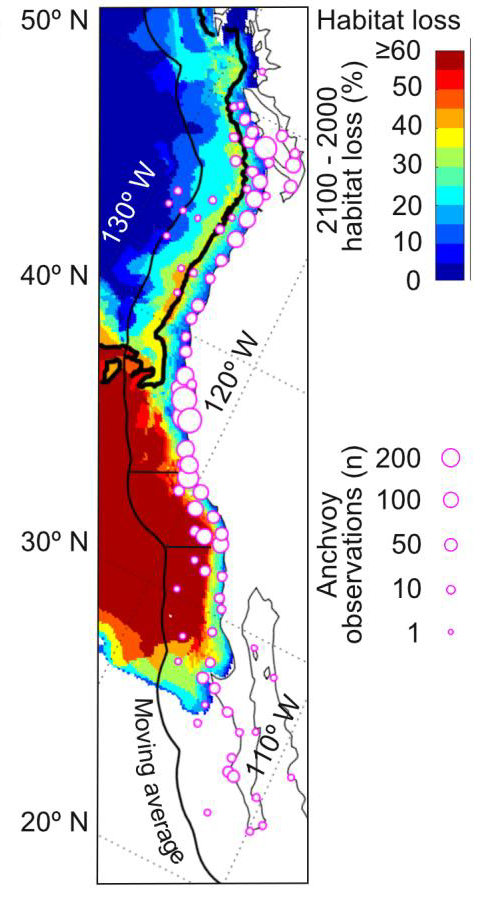
Aerobic habitat compression for anchovy. Aerobic habitat compression in 2100 compared to 2000. Areas in red will lose the most habitat suitable for anchovy. Circles are anchovy observations, with larger circles depicting more anchovy observed. Credit Howard et al. 2020 (Fig. S8. Supplementary Materials)
A newly published study expects climate warming to intensify hypoxia (low oxygen levels) in the California Current System (CCS), threatening its diversity and productivity.
Global Earth System Models predict the North Pacific Ocean to be a region of substantial future oxygen loss. As ocean water heats up, its capacity to hold dissolved oxygen decreases. For organisms, as water gets warmer, they require more oxygen to survive. This means that in the future warmer ocean, many species such as the northern anchovy will have less habitat that can support their respiration needs.
NCCOS sponsored research, led by the University of Washington School of Oceanography and partners at UCLA and SCWRRP, analyzed past variability and future changes in how well various species in the CCS can meet their physiological oxygen and temperature requirements.
In the CCS, projected aerobic (oxygenated) habitat loss impacts will vary widely across different species. Some species will be able to survive in certain areas, whereas other species will not. This can disrupt ecological interactions throughout the region.
The study shows that the long-term distribution and abundance of northern anchovy are highly correlated with the volume of aerobic habitat available. Ocean warming and oxygen loss by 2100 in the CCS are projected to decrease habitat oxygen levels in many areas below the northern anchovy’s metabolic requirements, causing the anchovy to lose up to 50 percent of its current range, largely in the southern CCS.
Citation: Howard, Evan M., Justin L. Penn, Hartmut Frenzel, Brad A. Seibel, Daniele Bianchi, Lionel Renault, Fayçal Kessouri, Martha A. Sutula, James C. McWilliams and Curtis Deutsch. 2020. Climate-driven aerobic habitat loss in the California Current System. ScienceAdvances 6(20), eaay3188. doi: 10.1126/sciadv.aay3188
NCCOS Projects Supporting this Research:
- How will Changing Temperature and Oxygen Conditions in the California Current System Influence Important Fish and Shellfish Species?
- Supporting Ecosystem Prediction and Environmental Management of Nutrients and Acidification in the California Current System
Webinar:
- NOAA Science Webinar, by Dr. Curtis Deutsch: Climate change and ecosystem response in the California Current System, part of the "Stressed Out by Ocean Acidification" webinar series (28 July 2020).
 Official websites use .gov
A .gov website belongs to an official government organization in the United States.
Official websites use .gov
A .gov website belongs to an official government organization in the United States. Secure .gov websites use HTTPS
A lock or https:// means you’ve safely connected to the .gov website. Share sensitive information only on official, secure websites.
Secure .gov websites use HTTPS
A lock or https:// means you’ve safely connected to the .gov website. Share sensitive information only on official, secure websites.